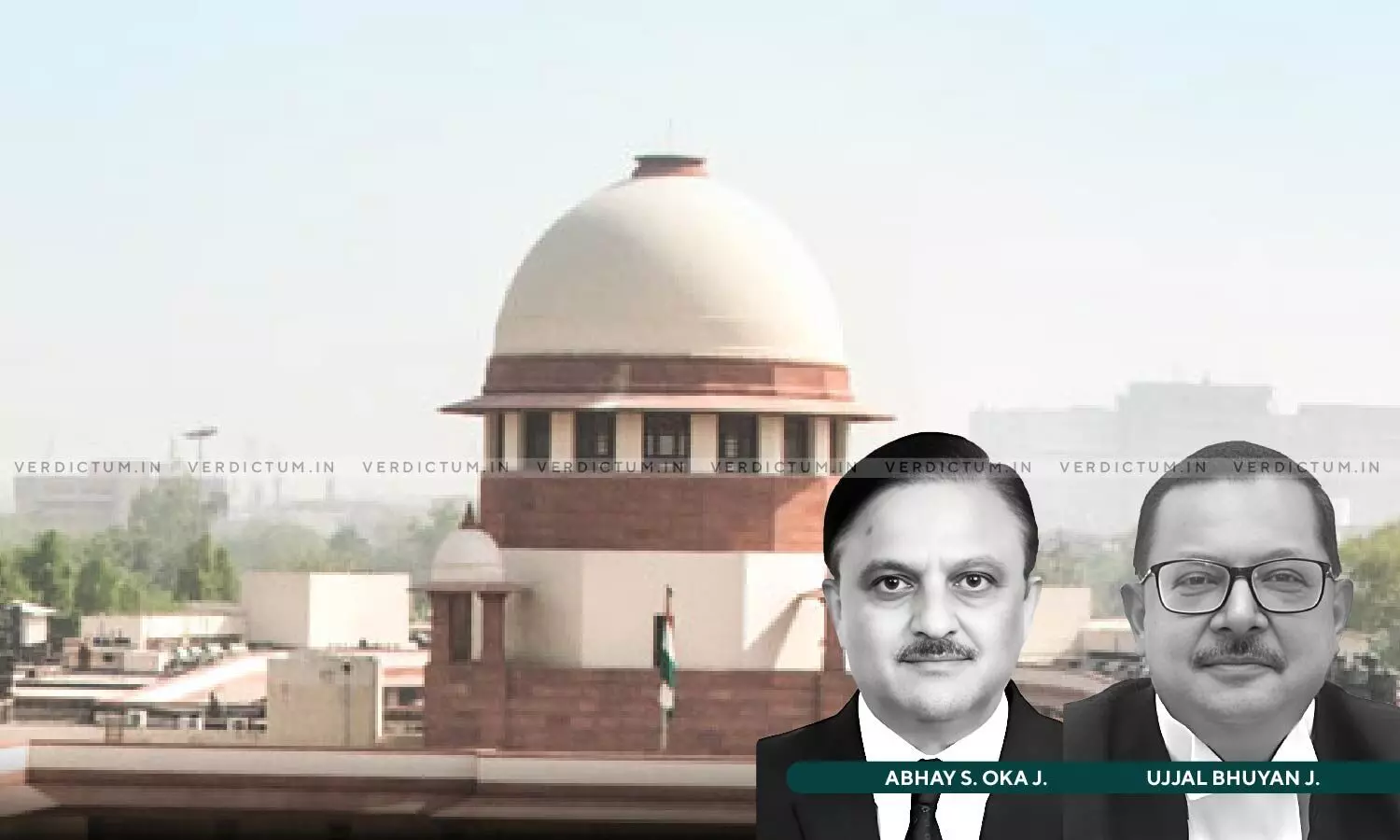
Peculiar Practice Of Filing 'Minutes Of Order' In Bombay HC: Supreme Court Lays Down Guidelines
 |
|The Supreme Court held that it is the duty of a court to determine the lawfulness of an order passed in accordance with the "Minutes of Order" after these minutes were presented to the court by the advocates.
The Bench noted that the practice of filing “Minutes of Order” which prevailed in the Bombay High Court is done as a “courtesy” to assist the Court by the advocates appearing for the parties to the proceedings.
Justice Abhay S. Oka and Justice Ujjal Bhuyan observed, “For the convenience of the Court and as a matter of courtesy, the advocates draft “Minutes of Order” containing what could be incorporated by the Court in its order. Perhaps this practice was evolved to save the time of the Court. The advocates who sign and tender the “Minutes of Order” have greater responsibility. Before they sign the “Minutes of the order”, the advocates have an important duty to perform as officers of the Court to consider whether the order they were proposing will be lawful. They cannot mechanically sign the same. After all, they are the officers of the Court first and the mouthpieces of their respective clients after that.”
The court also observed as follows:
a) The practice of filing “Minutes of Order” prevails in the Bombay High Court. As a courtesy to the Court, the advocates appearing for the parties to the proceedings tender “Minutes of Order” containing what could be recorded by the Court in its order. The object is to assist the Court;
b) An order passed in terms of the “Minutes of Order” tendered on record by the advocates representing the parties to the proceedings is not a consent order. It is an order in invitum for all purposes;
c) Before tendering the “Minutes of Order” to the Court, the advocates must consider whether an order, if passed by the Court in terms of the “Minutes of Order,” would be lawful. After “Minutes of Order” is tendered before the Court, it is the duty of the Court to decide whether an order passed in terms of the “Minutes of Order” would be lawful. The Court must apply its mind whether the parties who are likely to be affected by an order in terms of the “Minutes of Order” have been impleaded to the proceedings;
d) If the Court is of the view that an order made in terms of the “Minutes of Order” tendered by the advocates will not be lawful, the Court should decline to pass an order in terms of the “Minutes of Order”; and e) If the Court finds that all the parties likely to be affected by an order in terms of the “Minutes of Order” are not parties to the proceedings, the Court will be well advised to defer passing of the order till all the necessary parties are impleaded to the proceedings.
Advocate Rajesh Vishnu Adrekar represented the appellants, while Advocate Karl Tamboli appeared for the respondents.
The Bombay High Court via its order had allowed the construction of a compound wall under police protection, based on "Minutes of Order" submitted by advocates. The appellants contested this order, arguing that it was passed without considering objections raised by government officers and without impleading affected parties. Despite objections, the Division Bench upheld the order, prompting the appeal. Reasons were also not recorded for passing an order in terms of the ‘Minutes of Order’ by the Division Bench of the High Court.
The Supreme Court pointed out how the Bombay High Court followed the practice of filing "Minutes of Order," where advocates appearing for the parties to the proceedings tendered “Minutes of Order” containing what could be recorded by the Court in its order which assists the Court.
However, the Bench clarified that an order based on these minutes was not a consent order but an order in invitum for all purposes. the court remarked that Before tendering the “Minutes of Order” to the Court, the advocates must consider whether an order, if passed by the Court in terms of the “Minutes of Order,” would be lawful. After “Minutes of Order” is tendered before the Court, it is the duty of the Court to decide whether an order passed in terms of the “Minutes of Order” would be lawful.
It was clarified that upon receipt, it becomes the Court's responsibility to apply its mind to determine the legality of any order based on these minutes and whether all relevant parties were likely to be affected by such an order. The Court stated, “If the Court finds that all the parties likely to be affected by an order in terms of the “Minutes of Order” are not parties to the proceedings, the Court will be well advised to defer passing of the order till all the necessary parties are impleaded to the proceedings.”
The Court held that the order passed in terms of the “Minutes of Order” was entirely illegal and was set aside and the matter was remanded to the High Court while clarifying that the construction would be subject to the final decision in the Writ Petition. “Division Bench of the High Court has failed to make even an elementary enquiry whether third parties will be affected by the construction of the compound wall under police protection,” the Court added.
Accordingly, the Supreme Court partly allowed the appeal.
Cause Title: Ajay Ishwar Ghute & Ors. v. Meher K. Patel & Ors. (Neutral Citation: 2024 INSC 353)
Appearance:
Appellants: AOR Usha Nandini V.; Advocate Rajesh Vishnu Adrekar
Respondents: AOR Aaditya Aniruddha Pande and T.R.B. Sivakumar; Advocates Karl Tamboli, Tahira Karanjawala, Arjun Sharma, Purazar Fouzdar, Varuna Juneja, Jai Vardhan Malaviya, Siddharth Dharmadhikari, Bharat Bagla, Sourav Singh, Aditya Krishna, Aadarsh Dubey, Preet S. Phanse, Prashant R. Dahat, Puneet Yadav, Sourabh Gupta, and Ujjwal Choudhary